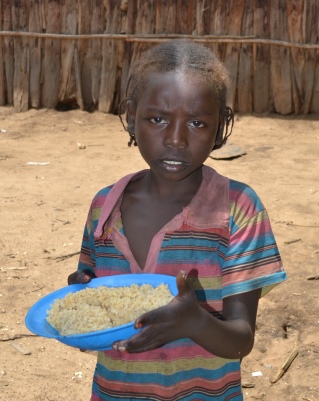By Desta Gebrehiwot, Ethiopian Herald.
- Food for thought, Ethiopia's education system down the road

Across the developing world, millions of school-age children are affected by serious - yet easily treatable and preventable illnesses, which inhibit their ability to learn.
True to the saying 'One cannot think well, love well, sleep well, if one has not dined well,' healthier children stay in school longer, attend more regularly, learn more and become healthier and more productive adults. The provision of quality schools, textbooks and teachers can result in effective education only if the child is healthy, ready and able to learn.
When school feeding programmes are implemented as part of a wider school health and nutrition package including deforming, nutrition education and access to safe water they can have an even greater impact on child nutrition. School feeding also increases school enrollment and attendance as children are more likely to go and stay in school.
Increasingly a number of countries are now implementing
Home Grown School Feeding (HGSF) programmes, a concept which brings together improved health, education and agricultural development by ensuring that food used in school meals is procured locally from smallholder farmers. HGSF aims at helping both farmers and children alike.
Lately,
Ethiopia announced to implement national School Feeding programme at all schools as part of the newly developed National School Health Nutrition Strategy, The Ethiopian Herald learnt at the opening ceremony of the two-day long consultative workshop on 'Systematic Approach for Better Education. The consultative workshop was organized to help identify capacity gaps and to formulate strategies for school feeding programme.
The national school feeding programme is different from the previous similar schemes. The previous school feeding programme has been reaching selected schools, where students prove vulnerable to malnutrition and food shortage. But, the new national school feeding programme will be applicable at all schools either private or public in towns or rural areas. The programme will be integrated to national education system.
The feeding scheme will primarily be applied in primary schools as a pilot project and will consequently be cascaded to other levels.
The school feeding programme is part of the ongoing global efforts to achieve education for all and school safety-net programme. The government has developed the programme to ensure transition from donor funded programmes to national ownership and are seekign to extend the current coverage across more schools, said Eshetu Assefaw, Action Planning Resource Mobilization Director at Ministry of Education.
School Feeding progammes have been implemented in many countries and are vital in places where there is food shortage and malnutrition. Ethiopia's programme is developed in line with country's second Growth And Transformation Plan that is geared towards ensuring food security and ending abject poverty.',said Bachir Sarr, Senior Policy Analyst at the
Partnership for Children Development .
"PCD has been working with the Government on number of school health activities in Ethiopia particularly in 30 schools located at SNNPR state. Through this programme children are benefiting from daily school feeding services, deworming, sanitation facilities and health educational facilities. The schools benefiting from this programme have experienced increases in student enrollment and decreases in infections diseases." noted Dr Laura Appleby NTD Manager for the
Partnership for Child Development,
"It does take significant resources and strong policy framework to implement an effective and sustainable national school feeding scheme. PCD is committed to work with the Ministry of Education to develop its practical national strategy in this regard", added Dr Appleby.
Speaking at the National School Health Nutrition Strategy launched.
Save the Children Deputy Country Director, John Lendin said, ' Students need to be healthy and well nurtured to be able to achieve a quality education. This strategy recognizes this as an important issue in the country. The ministry is in the lead and the government is dedicated towards ensuring better education system and Save Children will bolster the efforts. '
The Government is on the right path to implement the policy , there is no country in the world where the the issue of school sanitation and nutrition are fully completed and resolved . It will take a while to get the strategy implemented but with the commitment of the government and interventions of donor organizations , the policy will successfully be implemented.

